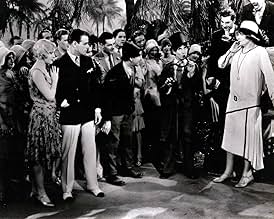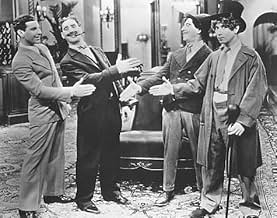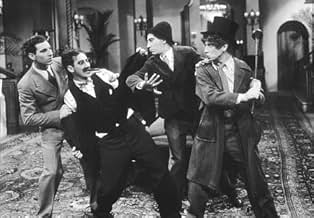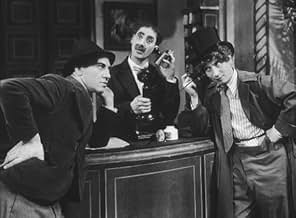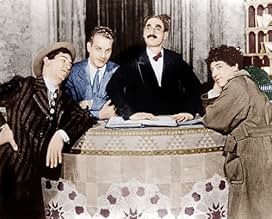VALUTAZIONE IMDb
6,8/10
8575
LA TUA VALUTAZIONE
Aggiungi una trama nella tua linguaDuring the Florida land boom, The Marx Brothers run a hotel, auction off some land, thwart a jewel robbery, and generally act like themselves.During the Florida land boom, The Marx Brothers run a hotel, auction off some land, thwart a jewel robbery, and generally act like themselves.During the Florida land boom, The Marx Brothers run a hotel, auction off some land, thwart a jewel robbery, and generally act like themselves.
- Regia
- Sceneggiatura
- Star
- Premi
- 2 candidature totali
Groucho Marx
- Hammer
- (as Marx Brothers)
Harpo Marx
- Harpo
- (as Marx brothers)
Chico Marx
- Chico
- (as Marx Brothers)
Zeppo Marx
- Jamison
- (as Marx Brothers)
Gamby-Hale Ballet Girls
- Dancers
- (as Gamby-Hale Girls)
Dolores Hope
- Dancer
- (non citato nei titoli originali)
Sylvan Lee
- Bell Captain
- (non citato nei titoli originali)
Barton MacLane
- Lifeguard
- (non citato nei titoli originali)
Recensioni in evidenza
I've been told it's the first musical comedy to have been made. God only knows what that makes The Jazz Singer then - heavyweight drama, I suppose.
The first problem you're going to have if you want to see it is actually seeing it. The film has been very hard to find on DVD. A copy is now available on the recently released version of the UK box set of their early films but as yet has not been released on it's own. I believe this situation varies elsewhere in the world.
The second problem you'll have if you want to see it is actually seeing it. Beware cheap copies from distant lands. The film has fallen into disrepair due to neglect. This has meant that some copies of the film are almost totally unwatchable. I remember being given a copy of the film that was released in Australia where parts of the picture had been almost completely washed away while the soundtrack could barely be heard of the crackles of the tape.
Still, if you do find a good copy it is well worth watching. The filming is very static and the acting wooden in comparison to their later movies. However, given that this was their first release and based upon their second successful Broadway run, I think that can be forgiven.
The characters are already clearly drawn out and some of the sketches are as funny as anything they did later on in their career. The 'Why a Duck' sketch can rate along side the 'tootsie-frootsie' sketch as one of the best sketches between Groucho and Chico.
The music is forgettable, the plot wafer thin, but you'll laugh out loud more than the majority of the films you'll ever see.
The first problem you're going to have if you want to see it is actually seeing it. The film has been very hard to find on DVD. A copy is now available on the recently released version of the UK box set of their early films but as yet has not been released on it's own. I believe this situation varies elsewhere in the world.
The second problem you'll have if you want to see it is actually seeing it. Beware cheap copies from distant lands. The film has fallen into disrepair due to neglect. This has meant that some copies of the film are almost totally unwatchable. I remember being given a copy of the film that was released in Australia where parts of the picture had been almost completely washed away while the soundtrack could barely be heard of the crackles of the tape.
Still, if you do find a good copy it is well worth watching. The filming is very static and the acting wooden in comparison to their later movies. However, given that this was their first release and based upon their second successful Broadway run, I think that can be forgiven.
The characters are already clearly drawn out and some of the sketches are as funny as anything they did later on in their career. The 'Why a Duck' sketch can rate along side the 'tootsie-frootsie' sketch as one of the best sketches between Groucho and Chico.
The music is forgettable, the plot wafer thin, but you'll laugh out loud more than the majority of the films you'll ever see.
"The Coconuts", being the Marx Brothers' first film, is bound to be a little creaky. This does not mean you should miss it, however! Groucho delivers some of his most scathing one-liners, Harpo provides a perfect blend of devilry and sympathy, and Chico struts like a peacock. Even the fabulous Margaret Dumont gets in on the action, telling her warbling daughter to "stop singing on the beach at all hours" after one truly atrocious song. What brings this film down is bad editing and the godawful songs--Mary Eaton singing "Do the Monkey Doodle Do"--say WHAT!?!? The dancing is,as Groucho states, "A little entertainment--very little." And Harpo's harp solo was really just pasted in there. Stay away from the fast-forward button, though--the songs are just as laughable as the jokes(for all the wrong reasons, of course), as is Kay Francis's drag queen-esque performance. And don't miss the show-stopper "I want my shirt!" My sister and I were rolling on the ground laughing. The love couple is truly nauseating, but a touching moment is provided when the childlike Harpo comforts a heartbroken Mary Eaton. Full of vaudevillian jokes and biting one-liners, this is definitely a film no Marx Brothers fan should miss!
The Marx Brothers first motion picture and Paramount's first "all talking, all singing, all dancing" musical will delight fans of the Marx Brothers, musicals and early cinema alike. While dated and somewhat stagey, after all it *was* basically a filmed version of their hit Broadway show, it holds up better than many films of its day. Kaufman and Ryskind, who also wrote the stage show, wrote the screenplay with an eye to making the Marx Brothers wit appear spontaneous and natural. I remember how shocked I was when I first realized the boys were using a script!
The movie is laced with classics of Marxian comedy. The famous "Why a duck?" scene with Groucho and Chico (remember - it's pronounced Chick-o, not Cheek-o, because he was such a womanizer), Groucho answering the telephone at the hotel's front desk (Ice water? Ice water? Peel some onions. That'll make your eyes water.) and Harpo shaking hands with the house detective while all of the hotel silverware falls out of his coat pockets.
Margaret Dumont is priceless as the clueless matron. She claimed in later years it wasn't an act; she really had no idea what the brothers were doing. Regardless, she is the ideal foil for the boys as they tear into "polite" society.
Take a look at The Cocoanuts. You'll see the wellspring from which all that Marx madness flows.
Jon Brian Waugh
The movie is laced with classics of Marxian comedy. The famous "Why a duck?" scene with Groucho and Chico (remember - it's pronounced Chick-o, not Cheek-o, because he was such a womanizer), Groucho answering the telephone at the hotel's front desk (Ice water? Ice water? Peel some onions. That'll make your eyes water.) and Harpo shaking hands with the house detective while all of the hotel silverware falls out of his coat pockets.
Margaret Dumont is priceless as the clueless matron. She claimed in later years it wasn't an act; she really had no idea what the brothers were doing. Regardless, she is the ideal foil for the boys as they tear into "polite" society.
Take a look at The Cocoanuts. You'll see the wellspring from which all that Marx madness flows.
Jon Brian Waugh
A brilliant film debut by the Marx Brothers in this 1929 musical comedy (from Broadway) about land speculation in Florida, jewel thieves, and well the Marx Brothers. In their first film, all the familiar schtick and word play are already in place with Groucho, Chico, and Harpo all excellent.
As usual there is also a romantic young couple--Mary Eaton and Oscar Shaw--and bad guys--Kay Francis and Cyril Ring. Also making her film debut at age 40 is the wonderful and imperious Margaret Dumont. Basil Ruysdael plays the house detective. Zeppo Marx plays the desk clerk.
A blah ballad is sung to death, but The Monkey Doodle-Doo song is terrific and well sung and danced by Eaton (a Broadway star) and chorus. Oddly staged productions number with chorus in monkey suits and tourists milling about in the background. But Eaton is quite good, considering the early sound equipment. And she has great legs.
Francis is fun in her second film (she made five in 1929) but teamed with the unappealing Ring. Shaw is OK but seems too old to be playing the juvenile lead.
But while Dumont, Francis, and Eaton are fun, it's the 3 brothers who dominate the film. Several classic bits, including the viaduct gag, Chico's great piano solo, Harpo getting to steal a few scenes, and of course Groucho riding roughshod over everyone. What a treat! While Kay Francis went on to major stardom in the 30s, Mary Eaton made one disastrous film after this hit, Flo Ziegfeld's Glorifying the American Girl. That ended her starring career in Hollywood.
The more I watch the Marx Brothers the more I appreciate Chico, who was always my least favorite of the 3. Now I notice his perfect comic timing and I just love his piano solos.
As usual there is also a romantic young couple--Mary Eaton and Oscar Shaw--and bad guys--Kay Francis and Cyril Ring. Also making her film debut at age 40 is the wonderful and imperious Margaret Dumont. Basil Ruysdael plays the house detective. Zeppo Marx plays the desk clerk.
A blah ballad is sung to death, but The Monkey Doodle-Doo song is terrific and well sung and danced by Eaton (a Broadway star) and chorus. Oddly staged productions number with chorus in monkey suits and tourists milling about in the background. But Eaton is quite good, considering the early sound equipment. And she has great legs.
Francis is fun in her second film (she made five in 1929) but teamed with the unappealing Ring. Shaw is OK but seems too old to be playing the juvenile lead.
But while Dumont, Francis, and Eaton are fun, it's the 3 brothers who dominate the film. Several classic bits, including the viaduct gag, Chico's great piano solo, Harpo getting to steal a few scenes, and of course Groucho riding roughshod over everyone. What a treat! While Kay Francis went on to major stardom in the 30s, Mary Eaton made one disastrous film after this hit, Flo Ziegfeld's Glorifying the American Girl. That ended her starring career in Hollywood.
The more I watch the Marx Brothers the more I appreciate Chico, who was always my least favorite of the 3. Now I notice his perfect comic timing and I just love his piano solos.
Contrary to popular belief, Cocoanuts was not the first Marx Brothers movie. That honor belongs to Humorisk, a silent film which no longer exists. It was greeted with such hostility that one master reel was burned, and the other deteriorated in a producer's closet. It is difficult to imagine Chico and Groucho in a silent film, and while one might envision Harpo as the ultimate silent comedian, his whistling and horn-honking formed an essential part of his act.
By 1929, however, sound was here to stay, and many silent comics suddenly found themselves out of work. In fact, the only two comedians to successfully make the transition from silent to sound were Laurel and Hardy (Chaplin didn't make his first sound movie until 1940, and was never comfortable with sound). Comedy teams like Stan and Ollie and the Marx Brothers needed dialog; even Harpo communicated with his brothers using broad gestures and the aforementioned honks and whistles.
The biggest story of 1929 (besides the stock market crash) was the Florida land boom. Mr. Hammer (Groucho) is the manager of a struggling hotel, trying to lure customers so that he can sell them Florida lots. Of course, Astoria, Long Island, where this movie was filmed, is not exactly the Sunshine State, and the opening tribute to "sunny Florida" shows us some sand poured on a sound stage to simulate a beach and a painted backdrop of palm trees and coconut. Groucho pursues the rich Mrs. Potter (Margaret Dumont), whose daughter Polly (Mary Eaton) is in love with Bob Adams (Oscar Shaw). Also interested in Polly (or rather, her mother's money) is Harvey Yates (Cyril Ring). Together with his parter Penelope (Kay Francis), they decide to steal Mrs. Potter's expensive necklace and blame it on Bob, easing the way for Yates to marry Polly.
The highlight of the film is the famous "Why a duck?" routine. It's Chico versus the English language, and guess who wins? When Groucho tells Chico that there's going to be an auction, he replies: "I come from Italy on the Atlantic Auction." When Groucho talks about levees, Chico thinks that's the Jewish neighborhood. When he asks him what a radius is, Chico responds that it's WJZ, at that time a popular New York radio station. And when it comes to the word "viaduct" he is totally lost.
Groucho: "Here's a little peninsula and here is a viaduct leading over to the mainland."
Chico: "OK, why a duck? Waya no chicken?" Having been told by Groucho to keep the bidding high during the auction, Chico, in a very funny scene, takes over the whole show, refusing to let anyone else in on the action.
As far as the music is concerned, it is difficult to imagine Irving Berlin writing such drivel as "When My Dreams Come True" and "Monkey Doodle-Do." The former is sung in a duet between Mary Eaton and Oscar Shaw (whom Groucho described as "strictly no-talent"). Indeed it's hard to determine which is worse-Shaw's acting or his singing.
There was a song written for "Cocoanuts," however, that was rejected because it made the show too long. It became one of Berlin's greatest hits. The song was "Always."
The print quality varies from good to fair. It appears that Universal spliced together scenes from several different prints to make one entire movie.
By 1929, however, sound was here to stay, and many silent comics suddenly found themselves out of work. In fact, the only two comedians to successfully make the transition from silent to sound were Laurel and Hardy (Chaplin didn't make his first sound movie until 1940, and was never comfortable with sound). Comedy teams like Stan and Ollie and the Marx Brothers needed dialog; even Harpo communicated with his brothers using broad gestures and the aforementioned honks and whistles.
The biggest story of 1929 (besides the stock market crash) was the Florida land boom. Mr. Hammer (Groucho) is the manager of a struggling hotel, trying to lure customers so that he can sell them Florida lots. Of course, Astoria, Long Island, where this movie was filmed, is not exactly the Sunshine State, and the opening tribute to "sunny Florida" shows us some sand poured on a sound stage to simulate a beach and a painted backdrop of palm trees and coconut. Groucho pursues the rich Mrs. Potter (Margaret Dumont), whose daughter Polly (Mary Eaton) is in love with Bob Adams (Oscar Shaw). Also interested in Polly (or rather, her mother's money) is Harvey Yates (Cyril Ring). Together with his parter Penelope (Kay Francis), they decide to steal Mrs. Potter's expensive necklace and blame it on Bob, easing the way for Yates to marry Polly.
The highlight of the film is the famous "Why a duck?" routine. It's Chico versus the English language, and guess who wins? When Groucho tells Chico that there's going to be an auction, he replies: "I come from Italy on the Atlantic Auction." When Groucho talks about levees, Chico thinks that's the Jewish neighborhood. When he asks him what a radius is, Chico responds that it's WJZ, at that time a popular New York radio station. And when it comes to the word "viaduct" he is totally lost.
Groucho: "Here's a little peninsula and here is a viaduct leading over to the mainland."
Chico: "OK, why a duck? Waya no chicken?" Having been told by Groucho to keep the bidding high during the auction, Chico, in a very funny scene, takes over the whole show, refusing to let anyone else in on the action.
As far as the music is concerned, it is difficult to imagine Irving Berlin writing such drivel as "When My Dreams Come True" and "Monkey Doodle-Do." The former is sung in a duet between Mary Eaton and Oscar Shaw (whom Groucho described as "strictly no-talent"). Indeed it's hard to determine which is worse-Shaw's acting or his singing.
There was a song written for "Cocoanuts," however, that was rejected because it made the show too long. It became one of Berlin's greatest hits. The song was "Always."
The print quality varies from good to fair. It appears that Universal spliced together scenes from several different prints to make one entire movie.
Lo sapevi?
- QuizDuring the "Why a duck?" sequence, it seems that Groucho Marx almost calls Chico Marx "Ravelli", which is Chico's character in Animal Crackers. Since they were shooting The Cocoanuts in the morning and acting in Animal Crackers at night, this mix up is understandable.
- BlooperIn the opening scene, Hammer sends Jamison to meet a 4:15 train. When Jamison gets back, he refers to it as a 4:30 train.
- Curiosità sui creditiThe opening credits are run against a background of negative film of the "Monkey-Doodle-Doo" number.
- Versioni alternativeDeleted Scenes:
- When the bellboys are protesting against being unpaid, Zeppo tells them that Groucho has yet to arise at four in the afternoon. His comforting postscript, that Groucho always gets up on Wednesday, precedes his arrival. This scene was shot, but later cut after the preview, leaving Groucho descending down the stairs, still putting on his coat, allowing time to ward off his staff to catch a 4:15 train.
- Another item that was cut from the preview version of the film was a love ballad sung by Groucho to Margaret Dumont entitled "A Little Bungalow". Originally sung in the play by the romantic leads Polly Potter and Robert Adams, the song slowed up the picture.
- ConnessioniFeatured in 46th Annual Academy Awards (1974)
- Colonne sonoreFLORIDA BY THE SEA
(1925) (uncredited)
Written by Irving Berlin
Sung off-screen by chorus
Danced by Gamby-Hale Ballet Girls and Allan K. Foster Girls
I più visti
Accedi per valutare e creare un elenco di titoli salvati per ottenere consigli personalizzati
- How long is The Cocoanuts?Powered by Alexa
Dettagli
- Data di uscita
- Paese di origine
- Lingua
- Celebre anche come
- Los cocos
- Luoghi delle riprese
- Kaufman Astoria Studios - 3412 36th Street, Astoria, Queens, New York, New York, Stati Uniti(Paramount Astoria Studios site)
- Azienda produttrice
- Vedi altri crediti dell’azienda su IMDbPro
Botteghino
- Budget
- 500.000 USD (previsto)
- Lordo in tutto il mondo
- 57 USD
- Tempo di esecuzione1 ora 36 minuti
- Colore
Contribuisci a questa pagina
Suggerisci una modifica o aggiungi i contenuti mancanti


